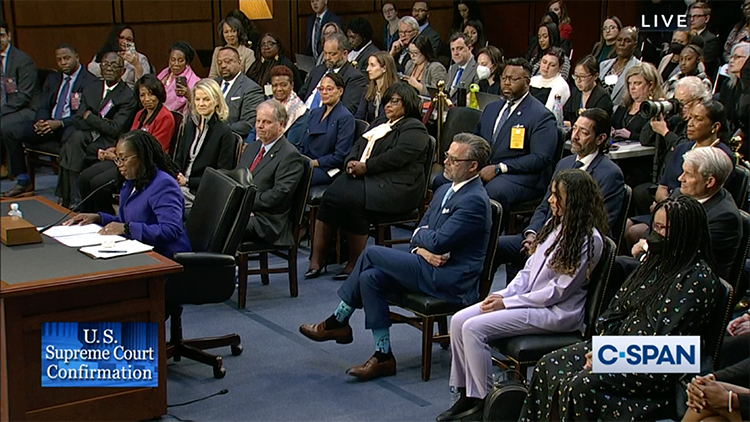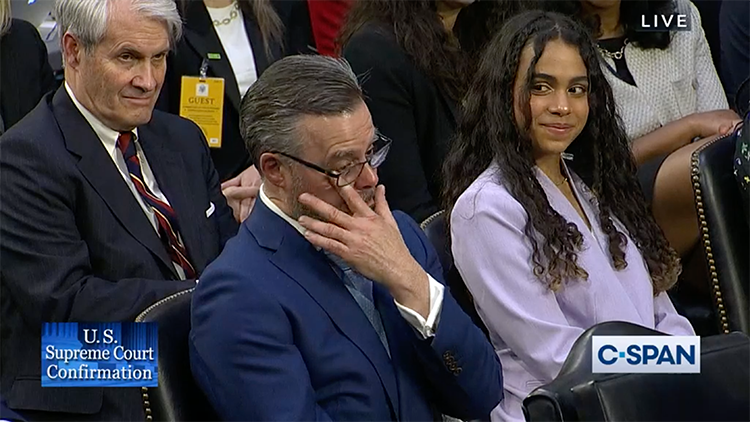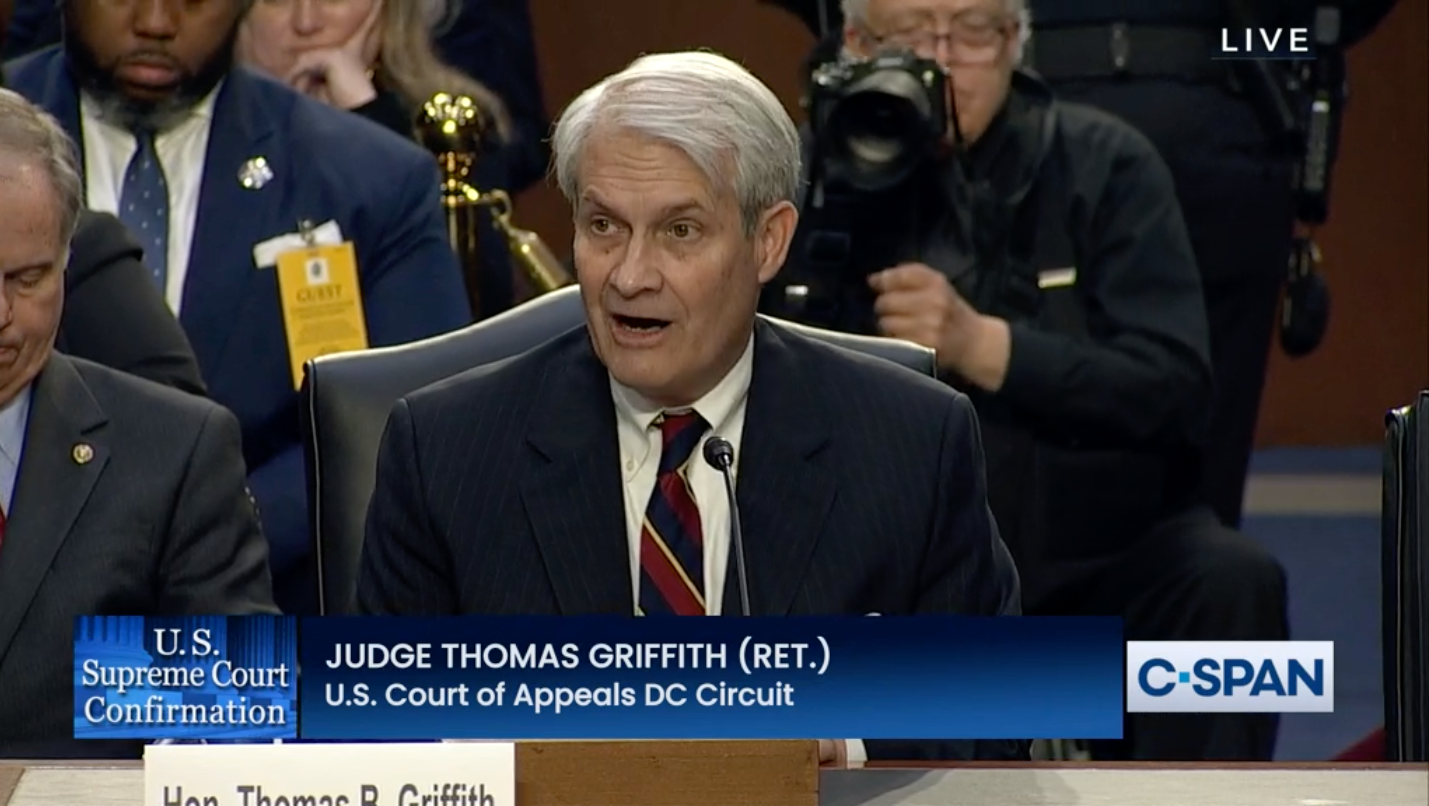Supreme Court nominee Jackson explains how she views judging, why her opinions are long

Judge Ketanji Brown Jackson was able to address the crowd at the end of the first day of hearings for her nomination to the U.S. Supreme Court. Photos from C-SPAN.
Supreme Court nominee Ketanji Brown Jackson pledged Monday to support the U.S. Constitution and the enduring “grand experiment in American democracy” if she is confirmed to the U.S. Supreme Court.
Jackson told senators at her confirmation hearing that she decides cases from “a neutral posture.” She evaluates the facts, then interprets and applies the law to the facts “without fear or favor.” Her role as a judge allows her to decide only the cases properly presented to her, with careful adherence to precedent, she said.
Jackson acknowledged that her opinions are on the long side, and explained the reason why. Jackson said she believes in transparency and litigants should know precisely what she thinks and the basis for her decisions. She wants litigants to know that she heard them, even if their arguments don’t prevail.
 Kentaji Brown Jackson’s parents Johnny and Ellery Brown attended her hearing. Jackson’s brother, Ketajh Brown, (top left) is an associate with K&L Gates in Chicago.
Kentaji Brown Jackson’s parents Johnny and Ellery Brown attended her hearing. Jackson’s brother, Ketajh Brown, (top left) is an associate with K&L Gates in Chicago.
Jackson spoke to members of the Senate Judiciary Committee after a round of opening statements by committee members, as GOP senators highlighted potential lines of attack when they begin questioning her on Tuesday.
Jackson began her statement by affirming her faith in God and her appreciation for being born in a great country more than 50 years ago, in September 1970, following the passage of civil rights legislation. She thanked her parents, her high school debate coach, her friends and her husband, Dr. Patrick Jackson, who appeared to tear up as she proclaimed her love for him.
Jackson also revealed that her parents gave her an African name, Ketanji Onyika, to express their hope for her future. The name, her parents were told, means “lovely one.”
“My parents taught me that unlike the many barriers that they had to face growing up, my path was clearer, so that if I worked hard and I believed in myself and America, I could do anything and be anything I wanted to be,” Jackson said.
 Ketanji Brown Jackson’s husband, Patrick, wipes away a tear as their younger daughter, Leila, looks on. Patrick Johnson is a surgeon at MedStar Georgetown University Hospital.
Ketanji Brown Jackson’s husband, Patrick, wipes away a tear as their younger daughter, Leila, looks on. Patrick Johnson is a surgeon at MedStar Georgetown University Hospital.
Jackson also acknowledged her daughters, Talia and Leila.
Jackson told her daughters she knows it hasn’t been easy as she tried to balance motherhood and career, and she knows she didn’t always get the balance right. But she hopes she has taught them they can achieve their goals with hard work, and she is looking forward to seeing what they will do with their “amazing lives in this incredible country.”
Character witnesses
Jackson was introduced to the Senate Judiciary Committee on Monday by a former federal appeals judge who reviewed her rulings and a former roommate who said she was “the rock” for their circle of friends.
 Thomas Griffith, a retired judge from the U.S. Court of Appeals for the D.C. Circuit, praised Jackson’s collegiality and diligence.
Thomas Griffith, a retired judge from the U.S. Court of Appeals for the D.C. Circuit, praised Jackson’s collegiality and diligence.Retired Judge Thomas Griffith of the U.S. Court of Appeals for the D.C. Circuit told the committee that he had many opportunities to review Jackson’s work as a federal trial judge before she was elevated to the D.C. Circuit.
Griffith said he and Jackson didn’t always agree on the outcome the law required, but he respected her “diligent and careful approach, her deep understanding and her collegial manner.” Griffith was an appointee of President George W. Bush.
Being collegial is an important aspect of a justice’s work that is often overlooked, Griffith said. Supreme Court justices debate the issues in a civil manner and have genuine respect for one another, he said. “It goes without saying that civility of debate and respect for the differing views of others are sorely lacking from our public life,” Griffith said. “Judge Jackson’s life has modeled these qualities.”
Griffith said Jackson is an independent jurist who decides cases on the basis of the facts and the law and not as a partisan.
“It takes a jurist of high character, keen intellect, deep legal knowledge and broad experience to ensure that the judiciary plays its unique role under the Constitution—to uphold the rule of law impartially and not to be, in the words of Justice Stephen Breyer, partisans in robes,” Griffith said. Jackson is “a jurist who has all of those qualities.”
 Lisa Fairfax, a professor at the University of Pennsylvania Carey Law School, was Jackson’s roommate at Harvard College and Harvard Law School.
Lisa Fairfax, a professor at the University of Pennsylvania Carey Law School, was Jackson’s roommate at Harvard College and Harvard Law School.Also introducing Jackson was Lisa Fairfax, a professor at the University of Pennsylvania Carey Law School. Fairfax was Jackson’s roommate at Harvard College and Harvard Law School.
“A woman of deep faith in God and unyielding love for family, Ketanji defines friendship,” Fairfax said. “She’s the friend you are immediately drawn to for their outgoing and friendly nature. As our circle of friends grew, she’s the one who became the rock for us all.”
Even though Fairfax and Jackson were the same age, Jackson was nonetheless a role model who encouraged Fairfax and other friends to succeed, Fairfax said. Fairfax noted that other friends have described Jackson as a coalition builder and a person with an unwavering work ethic. She seemed destined to become a judge because of her ability to see differing viewpoints.
“But our tight-knit group of girlfriends also knows that there is so much to Ketanji beyond her brilliant mind. There is her wonderful sense of humor, her gift of storytelling, her heart of gold,” Fairfax said.
The hearings resume Tuesday at 9 a.m. Eastern Time.
Updated at 5:13 p.m. to add remarks and photos of Griffiths and Fairfax.
Read our coverage of Judge Ketanji Brown Jackson’s U.S. Supreme Court nomination hearing here.



